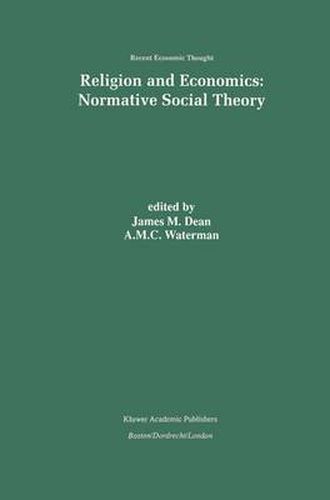Readings Newsletter
Become a Readings Member to make your shopping experience even easier.
Sign in or sign up for free!
You’re not far away from qualifying for FREE standard shipping within Australia
You’ve qualified for FREE standard shipping within Australia
The cart is loading…






This title is printed to order. This book may have been self-published. If so, we cannot guarantee the quality of the content. In the main most books will have gone through the editing process however some may not. We therefore suggest that you be aware of this before ordering this book. If in doubt check either the author or publisher’s details as we are unable to accept any returns unless they are faulty. Please contact us if you have any questions.
Normative Social Theory James M. Dean and A. M. C. Waterman University of Manitoba 1. Economics and Religion Once Again This hook is a sequel to Economics and Religion: Are They Distinct? (Brennan and Waterman 1994). That volume was motivated by a frustration born of many disappointing encounters between economists and theologians in the 1980s. Can bishops, synods, and other voices of organized religion bring any interesting (and disinterested) contribution to the public policy debate? If so, what is the relation of their contribution to that of the purely secular knowledge economists believe they can supply? Can economists bring any interesting (and disinterested) contribution to the public policy debate? If so, what is the relation of their contribution to the fundamental values that inform social ethics and that are still guarded to a large extent by religious tradition? All too often the two sides talked at cross-purposes. Well-intentioned economists coexisted for a few hours or days with well intentioned theologians whose manner of conceiving social reality was radically incompatible with their own. There seemed to be no common ground. The first requisite of any genuine conversation is an agreed conceptual framework that is able to accommodate the peculiar social vision both of the economist and of theologian, and to display the logical relation between the two.
$9.00 standard shipping within Australia
FREE standard shipping within Australia for orders over $100.00
Express & International shipping calculated at checkout
This title is printed to order. This book may have been self-published. If so, we cannot guarantee the quality of the content. In the main most books will have gone through the editing process however some may not. We therefore suggest that you be aware of this before ordering this book. If in doubt check either the author or publisher’s details as we are unable to accept any returns unless they are faulty. Please contact us if you have any questions.
Normative Social Theory James M. Dean and A. M. C. Waterman University of Manitoba 1. Economics and Religion Once Again This hook is a sequel to Economics and Religion: Are They Distinct? (Brennan and Waterman 1994). That volume was motivated by a frustration born of many disappointing encounters between economists and theologians in the 1980s. Can bishops, synods, and other voices of organized religion bring any interesting (and disinterested) contribution to the public policy debate? If so, what is the relation of their contribution to that of the purely secular knowledge economists believe they can supply? Can economists bring any interesting (and disinterested) contribution to the public policy debate? If so, what is the relation of their contribution to the fundamental values that inform social ethics and that are still guarded to a large extent by religious tradition? All too often the two sides talked at cross-purposes. Well-intentioned economists coexisted for a few hours or days with well intentioned theologians whose manner of conceiving social reality was radically incompatible with their own. There seemed to be no common ground. The first requisite of any genuine conversation is an agreed conceptual framework that is able to accommodate the peculiar social vision both of the economist and of theologian, and to display the logical relation between the two.